Today’s book round-up includes two books that are in my usual reading wheelhouse (a mystery and a book about children’s literacy) and three books that are a bit different—one about pregnancy, a book written for husbands, and a teen romance from the 1980s. As you’ll see, I had my reservations about each of the less conventional reads, though I have zero regrets about reading them.
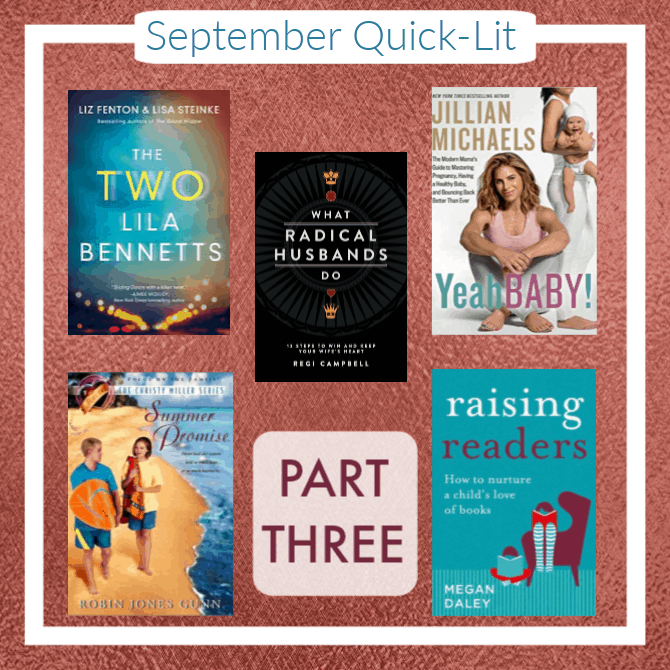
What Radical Husbands Do: 12 Steps to Win and Keep Your Wife’s Heart, by Regi Campbell: I’ve committed to reading all of the books Luke reads with his Men’s Leadership Group at church this year, so even though this one obviously doesn’t pertain to me, I added it to my reading queue. And I have to admit, I was definitely curious! (A friend who went through the curriculum last year said this was his favorite book they read all year.)
The publisher’s description of the book describes it well: “What Radical Husbands Do is a book written by a man for men. It gives people things to DO not to BE. No ‘psycho-babble,’ ‘religion,’ or ‘feel-good frills.’ Just straight up advice from a guy who has screwed up and learned how to make his marriage work through hard times.” Regi Campbell has been married for over forty years, but the marriage nearly ended after twelve years due to his selfish behavior, workaholism, anger issues, and drinking problems. His wife left him for a while, but she returned and they have been taking marriage a day at a time now for over thirty years.
Campbell walks husbands through twelve steps that will help men achieve the marriage they long for. Among these twelve steps are obvious tips (such as drop expectations, learn to listen, create an environment of acceptance) and others that wouldn’t be found in most marriage books (love what she loves, give up sex, eliminate all potential escape routes). These tips are given in a no-nonsense manner and illustrated with examples from Campbell’s own marriage and those of people he knows.
As a wife, I was intrigued by the male perspective on marriage. I agreed with some of Campbell’s points and disagreed with others. Mostly, I was saddened by the book’s tone, which makes marriage seem like drudgery, with men willingly making themselves martyrs to their insufferable wives. This has certainly not been my experience with marriage and I hope it hasn’t been Luke’s. I will say that Luke already does most of the actions recommended in this book, and I hope that it hasn’t been as difficult or unrewarding for him as this book would make these steps seem.
While this advice is directed towards men, many of the suggestions work equally well for women, and I took quite a few notes as I read. (I assume if a man is writing about these things, they are important for the men in a marriage too.) I appreciate the high value the author places on marriage, even when it’s hard, and I loved the final chapter on inviting God into our marriages and our lives.
My biggest problem with this book was the dry, unprofessional writing style. Luke said it didn’t bother him at all, that “it’s a book for guys and we don’t care about those things.” And maybe he’s right! (The other guys in his group loved the book as well, especially the direct writing style.) But any husbands out there who do care about the quality of writing in a book might want to skip this one.
My Rating: 3.5 Stars.
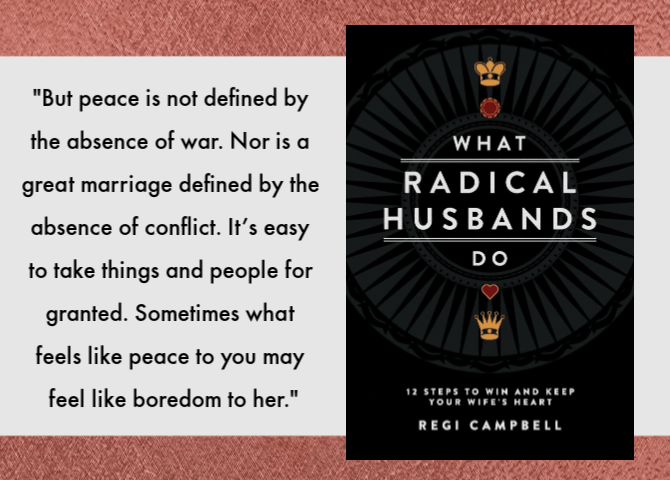
Raising Readers: How to Nurture a Child’s Love of Books, by Megan Daley: It’s no secret that I’m passionate about reading—for myself, for my fellow adults, and especially for children. As a former educator and a parent, I cannot overstate the important role books play in our children’s lives, and I am doing all I can to ensure that Charleston is raised in a home that values and prioritizes reading. In addition to my college textbooks on early education, and the wisdom gleaned from my time as a teacher and tutor, I’ve amassed a number of resources to guide me in my pursuit of raising readers. This book from teacher librarian Megan Daley is yet another resource I’m happily adding to my toolkit.
In this comprehensive guide, Daley shares from her experience as a mother, an educator, and librarian to help both parents and teachers create a literature-rich environment that sets the scene for positive reading experiences. Daley covers various aspects of reading, from teaching the mechanics of reading in the early years to curating a well-rounded home or school library. In addition to dozens of book lists (including lists for each age group and genre, and lists that address issues such as diversity, sustainability and nature, and mindfulness), Daley provides guides for book-themed rooms and parties, bookish gifts, and ideas for incorporating visuals and digital tools into reading. She addresses specific reading challenges, and in areas that are not her expertise, she invites fellow authors, writers, and reading experts to share their opinions and suggestions.
Raising Readers provides a wealth of information, to the point of becoming overwhelming. My biggest qualm with the book is that the intended audience isn’t always evident: some sections are clearly geared towards parents, others towards educators. Having my foot in both worlds (especially with plans to homeschool our kids) I didn’t mind this, but I can image this would be frustrating for teachers without kids or for parents without any experience in the educational realm.
Daley is Australian and many of her cultural references (especially descriptions of the Australian school system, and quite a few of the book suggestions) were difficult to relate to, although I did enjoy the insights into the educational practices of another part of the world. I disagree with many of Daley’s political views and some of the “agenda-pushing” promoted within a few of the book lists. Nevertheless, I am 100% on board with her primary message, and I admire her obvious passion for children’s literacy.
My Rating: 4 Stars.
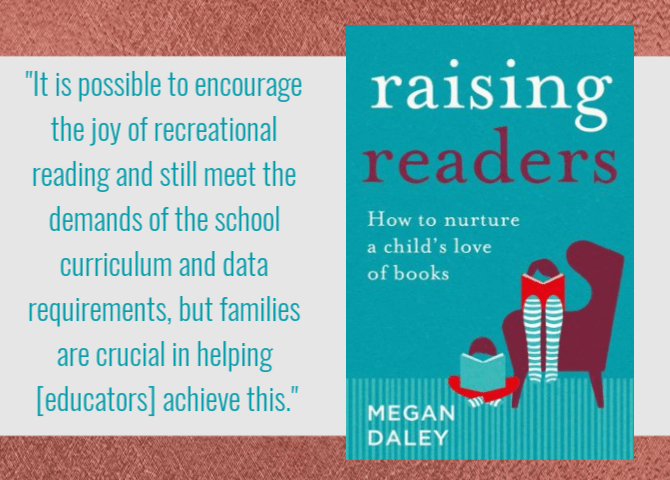
The Two Lila Bennetts, by Liz Fenton and Lisa Steinke: Lila Bennett is a ruthless criminal defense attorney who has made more than a few regrettable decisions in her life and her career. Now her poor choices have caught up with her as her life is split in two—with the two lives told in alternating chapters, each following one possible life trajectory.
In one life, Lila is taken captive by a kidnapper who knows all about her past and is determined that she pay for her crimes. In her alternate life, Lila’s work and relationships begin crumbling around her and she must decide whether to make amends or continue along an increasingly soul-sucking path.
This is a fast-paced read with a creative structure and compelling premise. It falls within the category of “thriller with substance,” examining important themes of regret, redemption, and justice. I was intrigued by the ways in which Lila’s emotions and actions played out within each of the storylines: though her circumstances are vastly different, her character remains consistent. Lila’s story prompted me to think about how we all are formed by events in our lives, and how these events wield the power to change who we are at our core.
I also enjoyed the novel’s legal component. I’ve often wondered how attorneys reconcile their personal convictions with their work, and The Two Lila Bennetts presents an insightful examination of the moral ambiguities involved in criminal law. The book’s ending is less conclusive than I would have liked, but I did find the clever interweaving of the two storylines very satisfactory.
My Rating: 4 Stars.
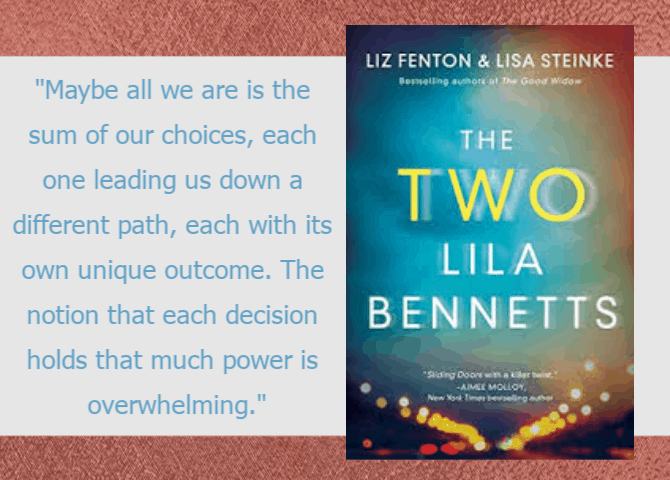
Summer Promise, by Robin Jones Gunn: Despite having grown up as a Christian and a bookworm in the 90s, I somehow missed reading the Christy Miller series. When Robin Jones Gunn appeared on Annie Downs’ podcast recently, I was reminded of these books that I’ve heard so much about from many friends my age, and I decided it was time to see what they were all about.
In this first book in the series, 14-year-old Christy has left her family farm in Wisconsin to spend the summer with her wealthy aunt and uncle in Southern California. Over the summer she butts heads with her snooty aunt; makes friends with a girl she admires but whose life isn’t as glamorous as it seems; and struggles to be true to herself when she isn’t even sure if her true self is somebody that she likes. When Christy falls for Todd, a surfer she meets on the beach, she will do anything to get his attention. But she soon learns that Todd is a Christian and that a relationship with Christy isn’t exactly his main priority for the summer.
This book reminded me of how far the YA genre has come since the late 1980s: the writing is pretty terrible, with incredibly obvious themes and an in-your-face evangelical message. I appreciated the book’s innocence and strong Christian themes, but the style and lack of subtlety don’t hold a candle to the books (even Christian books) being written for teens today. However, I did love the Newport Beach setting and chuckled at the 80s references—and was reminded of how different my childhood was from that of kids growing up today. I also enjoyed watching Christy mature in her faith over the course of the book, and though I doubt I’ll continue with the series, I do think I would have appreciated growing up with Christy and walking through similar life stages together.
My Rating: 3.5 Stars.
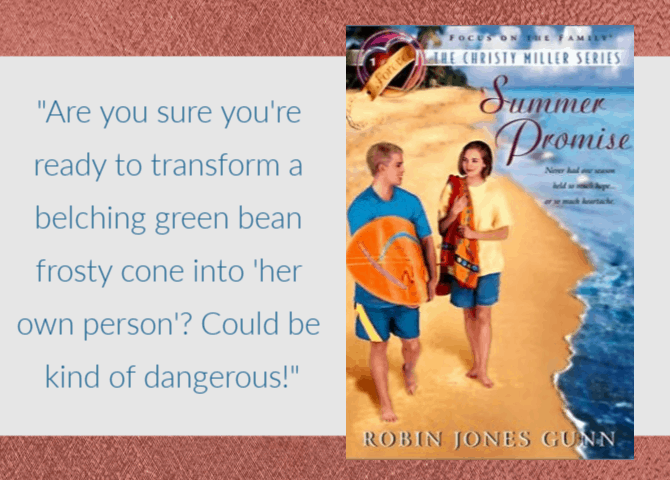
Yeah, Baby!: The Modern Mama’s Guide to Mastering Pregnancy, Having a Healthy Baby, and Bouncing Back Better Than Ever, by Jillian Michaels: I’ve wanted to read this book since it was published a few years ago because 1) I like Jillian Michaels (no, I don’t always see eye to eye with her, but I do think she has a good heart and I appreciate her passion for research/education and her no-nonsense approach), and 2) I’m interested in anything related to pregnancy and birth. Those subjects were sore spots for me in the last couple of years, though, so I set this book aside for when I was actually pregnant.
Though Michaels hasn’t given birth herself, she walked through pregnancy with her partner, Heidi; serving as Heidi’s pregnancy and birth coach ignited a passion for the subject. In this book, Michaels and her team of professional (including OBGYNs, naturopaths, and dietitians) guide women from pre-conception through delivery and recovery. The book is filled with general information about what is happening to your body and your baby at each stage, as well as Jillian’s tips for proper nutrition and exercise and other prenatal advice.
I was impressed with the book’s comprehensiveness, especially the sections about pre-pregnancy care, which is rarely addressed in such books. (In my own infertility journey I realized that our society is terribly uneducated in regards to fertility and reproductive health). I loved the positive tone and Michaels’ celebration of women and childbirth, and I liked her straightforward discussion of sensitive subjects: she states her opinion, but continually reminds mothers that we have options and that her way isn’t necessarily the best. Michaels is very compassionate, especially regarding labor decisions, giving moms tons of grace when their labors don’t go as planned, as Heidi’s didn’t. I was glad for additional experts voices and really enjoyed hearing the specifics of Heidi’s pregnancy from both Heidi and Jillian.
There was a lot of information I had to disregard as a twin mom (I am on exercise restrictions, so I skipped those chapters), and quite a bit that I already knew from having been pregnant and given birth before. I was also a bit confused by Michaels’ obsession with clean (organic) eating and detoxifying the environment, which was out of alignment with her quickness to downplay the benefits of natural labor methods. (For instance, she strongly recommends that women don’t give birth anywhere other than a hospital and is very pro- epidural, pro-intervention, and pro-C-section). But she does a good job of laying out all the options and noting the benefits and downsides to each.
Though I wouldn’t consider this my pregnancy Bible, I found it both interesting and informative. It got me thinking more critically about my own prenatal care and birth plans and helped me feel more connected to my pregnancy experience.
My Rating: 3.5 Stars.
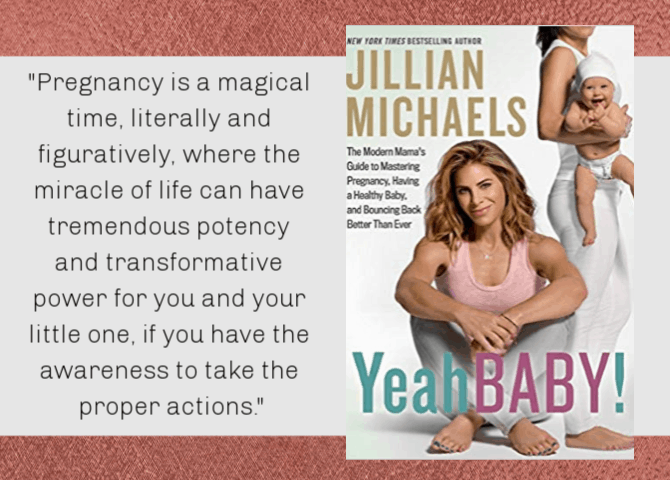
What is the best book you’ve read in the past month? Any surprise hits or unexpected duds? I’d love to hear about them!